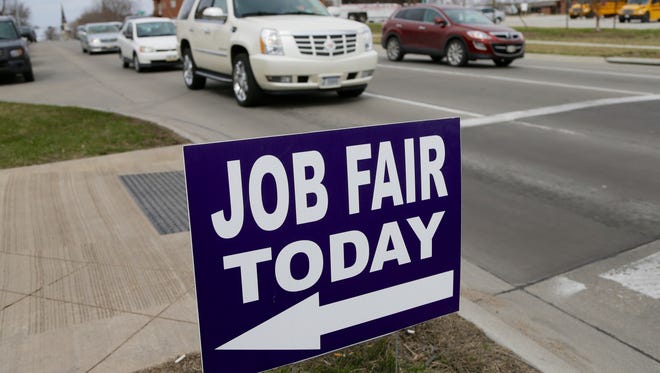Over the summer, as the economic outlook darkened, Vladimir Gendelman ditched plans to hire a marketing director at his company, fearing he would need to lay off the new executive within months.
But Gendelman, the CEO of CompanyFolders.com, recently reversed course and decided to post the opening for his 16-employee company, which makes folders, binders, and marketing materials.
“I know we need a marketing director because that will help us grow,” says Gendelman, whose company is based in Pontiac, Michigan. “Do I make a hiring decision out of fear and not do anything? Or do I make a hiring decision out of love and abundance?”
Bolstering his turnabout: Large company layoffs are throwing more skilled employees into a labor market still plagued by worker shortages. Gendelman recently received applications from about 100 qualified candidates. A year ago when he advertised the position, he got about 40 resumes, and only three had relevant experience.
Gendelman exemplifies the difficult decisions many businesses face as they grapple with persistent worker shortages in a still-hot labor market along with slowing sales, sharply higher borrowing costs, and the growing threat of recession next year.
As a result, many companies are battening down the hatches for the lean times ahead by dialing back hiring or laying off workers.
But others are bringing on more workers as sales, at least for now, continue to climb. Many companies scrambled for months to find staffers during COVID-19 and, if they let them go, fear they won’t be able to replace them once the economy rebounds. Some small businesses, like CompanyFolders, are eagerly snatching up the employees laid off by their larger publicly held competitors.
The result: an unusual split-screen job market.

“We’ve seen a little bit of a moderation” in hiring, largely in industries sensitive to higher interest rates such as housing, manufacturing, and autos, says Jim McCoy, senior vice president of talent solutions for ManpowerGroup, a leading staffing firm. “We’re not seeing any significant slowdown.”
Is the job market growing?
The dichotomy is reflected in the data. The number of U.S. job openings remained historically high at 10.1 million in August, though it eased from 11.1 million the month before. In September, net job growth stood at a solid 263,000, but was down from an average of 382,000 the previous three months and was the lowest since April 2021.
And initial unemployment claims, a gauge of layoffs, fell to 214,000 in mid-October, historically low but up noticeably from spring. Companies such as Intel, Oracle, Amazon, Apple, Netflix, and The Gap have cut hundreds or thousands of jobs.
Mark Zandi, the chief economist of Moody's Analytics, predicts monthly job gains will slow to about 225,000 by the end of the year, compared with his previous estimate of about 100,000. But by mid-2023, as interest rates rise further and job openings fall, job growth “will come to a standstill,” he predicts.
Which sectors suffer from rising interest rates
So far, technology companies have been among that hit hardest.
Seattle-based South Geeks, a startup software development company with about 70 employees across Latin America and the U.S., has seen revenue decline as venture capital companies grow skittish about funding new companies because of rising interest rates.
“If you can plunk your money into something that gives you a significant return (like bonds), why to do it with a higher-risk endeavor?” CEO Julia Duran says.
Duran had been planning to add four employees a month, but will now halve that total.

Another software company, Dallas-based ISHIR, posted revenue gains of about 20% early this year, but sales have been flat since April, says CEO Rishi Khanna. Worried about a downturn, large and midsize business customers are maintaining existing projects but canceling new ones.
Meanwhile, the interest rate on his credit line, which he taps for hiring and investment, has jumped from 6% to 11% since March as the Fed has jacked up rates. After adding about eight employees early this year, Khanna has paused hiring and is weighing layoffs by year-end to reduce costs.
“We have to maintain cash to navigate through the recession,” he says.
How can a company save money?
Other companies are putting new initiatives on hold.
Forever Floral, which sells handcrafted artificial bouquets online, is still benefiting from a resurgence in weddings postponed during COVID-19, with sales up 75% this year, says Alex Ledoux, CEO of the Ogden, Utah-based company.
What are examples of borrowing costs?
But the interest rate on the company’s credit line has shot up from 13% to 20%, and his working capital has dwindled by 60%. Ledoux is shelving a plan to wholesale its bouquets to stores like Target next year, which would have meant the addition of 30 employees.
“We’re holding the line,” Ledoux says. “We’re going to let demand lead hiring.”
Some businesses are stretching out their hiring timetables. Ironside Human Resources of Dallas, a healthcare recruiting firm, still plans to bring on 20 employees but will do so by March instead of December, CEO Doug Carter says.
Revenue growth for its clients, large hospitals, has slowed because of reduced reimbursement rates from Medicare and Medicaid amid federal and state budget cuts in a weakening economy and higher inflation, Carter says.

Hiring like it's 2021
Other companies are pressing ahead as they continue to recover from the pandemic’s woes.
COVID-19-related supply chain bottlenecks caused Thompson Tee, which makes sweat-resistant undershirts, to receive only about 60% of its inventory over the past two years, crushing sales despite healthy consumer demand, says CEO Billy Thompson.
Just in the past month, the snarls have eased for the company, he says, adding, “We’re finally getting every product.”
The company, with 10 employees, plans to add about three more next year.
“Will the weakening economy, inflation, or rising interest rates impact our customer demand” and hiring? Thompson asks. “I’ll worry about that when it happens.”

